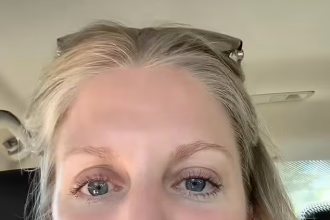Most nights as he lies down to sleep, Matt Ridout is overwhelmed by distracting noises – all of them inside his head.
These include the whooshing sound of his heartbeat, a pulse in his ears, a high-pitched ringing noise – and the bizarre sound of his eyeballs moving side to side, or up and down.
‘The eyeball sounds scratchy, like nails dragged on a pillowcase, it’s very specific,’ says Matt, 42, who runs an e-commerce business and lives in east London with his wife Komal, 38, a make-up artist, and their four-month-old daughter.
‘I notice these sounds mostly when I’m in bed,’ he says. ‘I have to play white noise on my phone to try to block it out so I can get some sleep.’
Like an estimated eight million people in the UK, Matt has tinnitus – hearing noises, such as ringing or hissing, that aren’t caused by an outside source. But he also suffers from another related, though rarer, condition – autophony, which people can mistake for tinnitus.
‘Patients often think of it as a type of tinnitus, but technically it’s not as you are hearing real sounds that are just being amplified,’ explains Gentle Wong, a consultant ear, nose and throat surgeon at the HCA Lister Hospital and London North West University Healthcare NHS Trust, both in London.
‘You typically hear bodily sounds such as your eyeballs moving, and others such as your own voice, breathing and chewing, or your footsteps, all sounding abnormally loud.’
There are one million tinnitus-related GP appointments every year, costing the NHS £750 million annually. There is currently no cure. For an estimated 80 per cent of people, like Matt, what starts as a temporary annoyance, ends up being a chronic problem.

Like an estimated eight million people in the UK, Matt Ridout, pictured, has tinnitus – hearing noises, such as ringing or hissing, that aren’t caused by an outside source

There are one million tinnitus-related GP appointments every year, costing the NHS £750 million annually
Now researchers at the University of Newcastle have made a breakthrough in understanding why this may be.
In their study, published this year in the journal Hearing Research, 55 patients who had been diagnosed with tinnitus less than eight weeks previously had scans to assess activity in two key areas of the brain – the anterior cingulate cortex and the parietal lobe.
It showed that these recently diagnosed people had abnormal activity in these regions of the brain and, crucially, this activity was different when they were followed up after six months or longer.
‘It opens up the possibility of maybe there being a window in the early stages of being able to turn the tinnitus noise off,’ explains Dr Abishek Umashankar, a postdoctoral research associate at the University of Newcastle Medical School, who led the study. ‘We don’t know this yet but that’s what we are investigating.’
Tinnitus is classed as chronic if it persists longer than six months, but the Newcastle research is one of the first studies to focus on the first few weeks of symptoms starting. ‘The brain should have capacity to turn off the tinnitus noise, but it doesn’t happen in most cases,’ says Dr Umashankar.
A follow-up study is now assessing if targeting these two brain areas in newly diagnosed patients with electrical stimulation and sound waves improves tinnitus.
When Matt first woke with a high-pitched ringing noise in his ears, he assumed it would be temporary. He’d had it before after gigs, but this time it persisted.
‘I’d been on a work night out and listened to loud music on my way home on headphones,’ he recalls.
‘I thought it would pass, but it just wouldn’t go away. That was 15 years ago. It hasn’t stopped since and has got progressively worse.’
In fact, Matt now has two different types of tinnitus, as well as the autophony, which causes him to hear his eyeballs moving and which started five years ago.

Symptoms can include a whooshing sound of the heartbeat, a pulse in the ears, a high-pitched ringing noise – and the bizarre sound of the eyeballs moving side to side, or up and down
He also has a noise-sensitivity condition called hyperacusis – as do many people with tinnitus.
Hyperacusis means everyday sounds such as sirens, alarms and even the clinking sound of plates and cutlery feel uncomfortable or painful.
‘Construction noise and loud sirens are definitely the worst,’ says Matt.
There are two main types of tinnitus: pulsatile and non-pulsatile, explains Mr Wong.
‘Non-pulsatile tinnitus is the most common type, with symptoms such as ringing, buzzing and hissing in the ears, which tend to be monotonous,’ he says.
‘Pulsatile tinnitus is where you hear certain sounds much louder than normal, such as your pulse and heartbeat, and is usually caused by a neurological or vascular abnormality.’
Like Matt, you may hear a whooshing or pulsing sound that is in rhythm with your heartbeat. ‘Effectively, you are hearing your blood flow,’ explains Mr Wong.
Causes of pulsatile tinnitus include changes in blood flow due to conditions such as high blood pressure, and hyperthyroidism (or overactive thyroid), which accelerates metabolism and causes a faster heart rate.
More rarely, it can be caused by a blockage in the main arteries in the neck or an aneurysm (a bulging blood vessel). (If you have tinnitus that beats in time with your pulse, seek an urgent GP appointment for assessment.)
Non-pulsatile tinnitus, the main type, can be triggered by noise exposure, viruses, head injuries, trauma, depression or stress.
‘We’ve not been able to pinpoint the exact mechanisms yet and that’s why currently there’s no cure,’ says Dr Gladys Sanda, an audiologist at OneWelbeck clinic in London. Often, non-pulsatile tinnitus is diagnosed alongside hearing loss – possibly the noise occurs as the brain makes up for the missing sound.
Dr Sanda says one theory is that tinnitus may be an early warning sign of a hearing problem. ‘Hormonal changes around the perimenopause and menopause are another possible cause, because there are oestrogen hormone receptors in the ears and, as oestrogen levels reduce, it changes the way the brain processes sounds,’ she adds.

Both types of tinnitus has improved over the past 20 years due to greater use of MRI scans, with sub-types also being identified
Mr Wong says understanding of both types of tinnitus has improved over the past 20 years due to greater use of MRI scans, with sub-types also being identified.
‘We used to think that tinnitus just came from the inner ear, but we now know tinnitus originates from the auditory cortex (the part of the brain that processes sound information),’ he says.
As for autophony, one possible cause is a third ‘window’ or hole forming in the bony labyrinth of the inner ear.
‘Sound comes in one window and has a barrelling effect, and pressure comes out of the other window,’ explains Mr Wong. ‘If a third window forms, sound can also escape through it, and this creates autophony. This can sometimes be repaired with surgery.’
Causes of this can be congenital or due to head injuries, infection or ageing, but sometimes the cause is not known.
Matt had scans in June 2022 to see if a ‘gap’ in the bone was why he was hearing his eyeballs move, but this proved to be normal, so an underlying cause has yet to be identified.
When he was first diagnosed, in his mid-30s, Matt had had tinnitus for several years. His GP initially suggested it could be down to ear wax. Matt had his ears syringed, but it made no difference.
Eight months later, an ENT specialist found Matt had slight hearing loss, but not severe enough to warrant a hearing aid (sometimes this can help by amplifying external sounds to mask tinnitus sounds).
He’s since seen four specialists, paid thousands for private treatments, as well as trying out techniques he’s researched himself.
‘Some things, like using white noise to get to sleep and taking magnesium supplements to relax the muscles in my jaw and surrounding areas, have helped. But the tinnitus noise is still there all the time,’ he says.
However, Matt has had some success after eight months of his pulsatile tinnitus starting, as it emerged he has a sub-type of middle-ear tinnitus – where twitching of specific nerves in the ear was causing him to hear the pulsing heartbeat noise in his ears.
Doctors suggested that temporomandibular joint (TMJ) disorder – a condition affecting movement of the jaw, which can irritate nerves – could be the root cause.
Last year, he paid privately to be treated with a Velvet TMJ machine, a device which uses high frequency electrical currents to relax muscles and reduce inflammation in the neck and jaw. Matt says this has greatly reduced the pulsing form of his tinnitus, at least. ‘I live in hope that a new treatment will come along for my other problems,’ he says.
For now, he manages symptoms with meditation and breathing exercises, as stress can make tinnitus worse. ‘I also avoid loud environments, caffeine and hard, crunchy foods as these can cause a flare up.’
One newer treatment for non-pulsatile tinnitus available privately is Lenire, which combines sound therapy (delivered to the auditory nerve through headphones) with gentle electrical pulses sent to the tongue, via a device you place in your mouth.
Used for 60 minutes a day, the claim is it retrains neurons in the brain to reduce its attention to tinnitus sounds.
In a randomised controlled trial published in Nature in 2022, funded by the maker, 70.1 per cent of patients with moderate or worse tinnitus reported improvement after six weeks. It costs around £3,600 and is not available on the NHS. Mr Wong says he has referred patients privately for Lenire ‘with good results’.
‘Some people get very depressed and even suicidal about tinnitus, and I understand why,’ says Matt, who shares his story and tips for coping with the different types of tinnitus on TikTok (Living with Tinnitus @itaintezee).
He says: ‘It’s true there is still no cure, but there are definitely things you can do.’


















